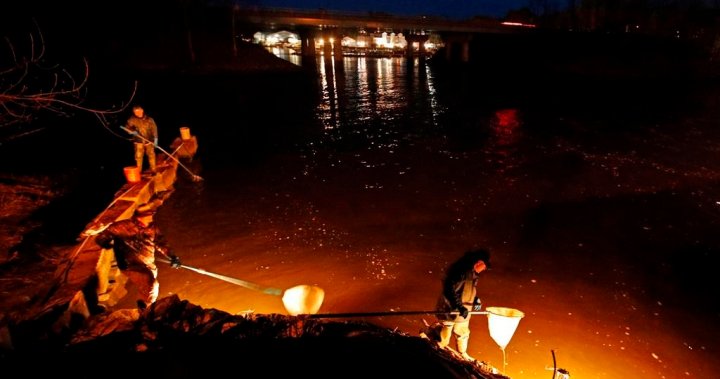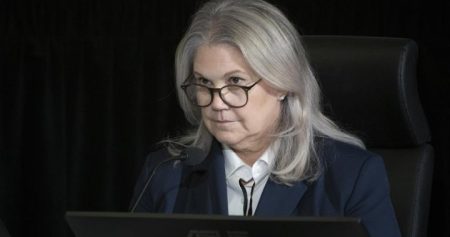This incident, involving the arrest and subsequent release of two Mi’kmaq elver fishers, highlights the complex and often fraught relationship between Indigenous fishing rights, government regulation, and law enforcement practices. Kevin Hartling and Blaise Sylliboy, both in their twenties, were apprehended while fishing for baby eels, also known as elvers, near Shelburne, Nova Scotia, on March 26th. The arrest, conducted by three federal fisheries officers, took a controversial turn when the officers confiscated the fishers’ phones and hip waders, essential gear for their safety and livelihood, before leaving them stranded at a gas station, a considerable distance from their fishing location. This action, perceived by many as unduly harsh and potentially endangering the fishers’ well-being, ignited a debate surrounding the appropriate conduct of law enforcement when interacting with Indigenous communities exercising their treaty rights.
The details of the incident, as reported by Hartling, paint a picture of vulnerability and hardship. After being asked to leave the gas station, presumably due to their lack of footwear, Hartling and Sylliboy were left to navigate the cold night in their socks, walking along a highway in southern Nova Scotia for hours. Their ordeal only ended when they managed to borrow a cellphone and contact a friend who subsequently provided them with transportation. This account underscores the precarious situation in which the two fishers were placed, raising concerns about the officers’ judgment and their duty of care. The confiscation of essential gear, combined with their release in a remote location and without proper footwear, exposed them to potential risks, highlighting the need for a thorough examination of the officers’ actions.
The repercussions of the incident extended beyond the immediate experience of the two Mi’kmaq fishers. One of the officers involved in the arrest received a ten-day suspension without pay, a penalty that was confirmed by The Canadian Press. However, information regarding sanctions imposed on the other two officers, who held more junior positions, remains unconfirmed. The disciplinary action, while taken against only one officer at the time of reporting, sparked a protest within the ranks of the federal Fisheries Department. Numerous enforcement officers in Nova Scotia and New Brunswick reportedly booked off on mental health leave in a show of solidarity with their colleague, suggesting a deep-seated disagreement within the department regarding the handling of the incident and the subsequent penalties.
The protest by the fisheries officers, while not officially confirmed by their union, the Union of Health and Environment Workers, adds another layer of complexity to the situation. Their action could be interpreted as a pushback against what they perceive as unfair treatment of their colleague, potentially reflecting existing tensions between enforcement officers and departmental policies or management. It also raises questions about the internal culture within the Fisheries Department and the potential impact of this incident on morale and operational effectiveness. The union’s decision to decline comment further shrouds the situation in ambiguity, leaving room for speculation about the specific grievances driving the officers’ protest.
The response, or lack thereof, from various official bodies contributes to the ongoing uncertainty surrounding the incident. Federal Fisheries Minister Diane Lebouthillier declined to comment, a stance that might be interpreted as a desire to avoid further inflaming the situation or potentially prejudicing any ongoing investigations. Similarly, a spokeswoman for the Assembly of Nova Scotia Mi’kmaw Chiefs opted not to comment, characterizing the matter as an “internal DFO matter,” suggesting a focus on allowing internal processes to unfold before issuing a public statement. This reticence from key stakeholders underscores the delicate political and social landscape surrounding Indigenous fishing rights and the challenges of balancing these rights with conservation efforts and law enforcement.
The incident involving Hartling and Sylliboy brings to the forefront broader issues concerning the relationship between Indigenous communities and government agencies tasked with regulating natural resources. It raises questions about the application of culturally sensitive law enforcement practices, the potential for power imbalances in interactions between officers and Indigenous individuals, and the need for clear protocols to ensure the safety and well-being of all parties involved. The fallout from this incident, including the officer’s suspension and the subsequent protest by fellow officers, suggests a need for deeper reflection within the Fisheries Department and a broader dialogue about how to navigate the complexities of enforcing regulations while respecting Indigenous treaty rights. The silence from key figures, while understandable in the short term, underscores the importance of addressing these issues openly and transparently to foster trust and build a more equitable and respectful relationship between government agencies and Indigenous communities.










